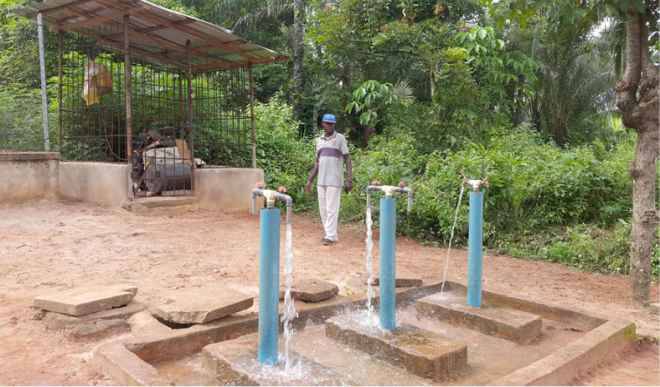
Nigeria still faces challenges despite substantial progress made in developing policies and strategies for water supply and sanitation service delivery.
About 70 million people, out of the total population are said lack access to safe drinking water, and over 110 million lack access to improved sanitation in 2013 while open defecation rates continue to pose grave public health risks.
A report by the World Health Organisation (WHO) revealed that access to safe water and sanitation is a major challenge in Nigeria. Water and sanitation coverage rates in the country are amongst the lowest in the world.
Nigeria is off-track with respect to the MDG targets for water (75%) and sanitation (65%) with major gaps in the rural areas. Among countries with similar population and similar GDP per capita, Nigeria fares poorly on the sanitation front.
Poor access to water and sanitation is directly linked to incidences of diarrhoea and this is clearly reflected in Nigeria being among the five countries contributing to half of global under-5 deaths.
Speaking at a United Nations Children Fund (UNICEF) workshop sponsored by the European Union in Akwa, Anambra State, UNICEF Water, Sanitation and Hygiene (WASH) specialist, Mainga Moono Banda, said Nigeria ranked among top three countries in the world with the largest number of people still practicing open defecation.
Banda quoted MICS5 2017 survey, which stated that over 46 million people still practice Open Defection (ODF) in Nigeria, with 33 million of this figure living in the rural area.
“130 million across the country use unapproved sanitary facilities, more than half live in the rural area while 45,000 children die annually from diseases caused by poor access to water, sanitation and hygiene,” she said.
According to her, WASH plays a critical role in improving health, nutrition and hygiene in Nigeria, adding that for Nigeria to meet up its SDG 6 on water and sanitation by 2030, provision of safe and adequate hygiene that would curb issues of water borne and sanitation related diseases is a necessity.
“Despite all effort, sanitation is declining instead of improving and this calls for concern. The trend in water availability between year 2000 and 2015 revealed that the gradient is going up instead of declining, same with sanitation especially in the rural area.”
She said the goal is, “We are not leaving anyone behind in achieving the target whether in the rural or urban area.”
The Minister of Information and Culture, Lai Mohammed, represented by a deputy director in the ministry, Mr Olumide Osanyinpeju, stressed the importance of WASH in the life of a child noting that clean water and sanitation are very essential for the survival and development of children.
He said “we are yet to attain that level where we can confidently say that our communities all have safe water, sanitation and hygiene.”
The main objective of the UNICEF/EU project in Anambra, Cross River, Jigawa, Kano, Osun and Yobe is to increase access to safe, adequate and sustainable WASH services delivery in six focal states while the specific objective is to support rural water and sanitation institutions in the states.
Thee secretary, WASHCOM in Ononaku Ezinifite in Aguata LGA, Anambra State, one of the benefitting communities, Mr Ike Christian, said since the project was completed in the community, they now have access to water.
He said the project has relieved them of a lot of stress, adding that the children used to go to a distance to fetch water for home use and people made use of the nearby bush to defecate but that now they have toilet facilities in the community and schools.
Mr Ike also said since the provision of water and toilet facilities, there has not been reported cases of any water-borne disease in the community, adding that people now take care of their environment because of the orientation they are getting from WASHCOM officials in the community.
Ononaku Ezinifite is one of the communities that have been declared Open Defecation Free in Anambra State.
A resident of the community, Uche Okonkwo, said “Defecating everywhere is not healthy for people because it generates a lot of sickness and diseases. But we thank God everywhere is neat in our community. No more typhoid or diarrhoea. We enjoin every community to imbibe the habit of neatness,” Okonkwo said.
The project was co-funded by EU and Anambra State government at 70 percent EU/UNICEF and 30 percent from the state government which was a public procurement concept awarded to the lowest bidder.

 Join Daily Trust WhatsApp Community For Quick Access To News and Happenings Around You.
Join Daily Trust WhatsApp Community For Quick Access To News and Happenings Around You.



